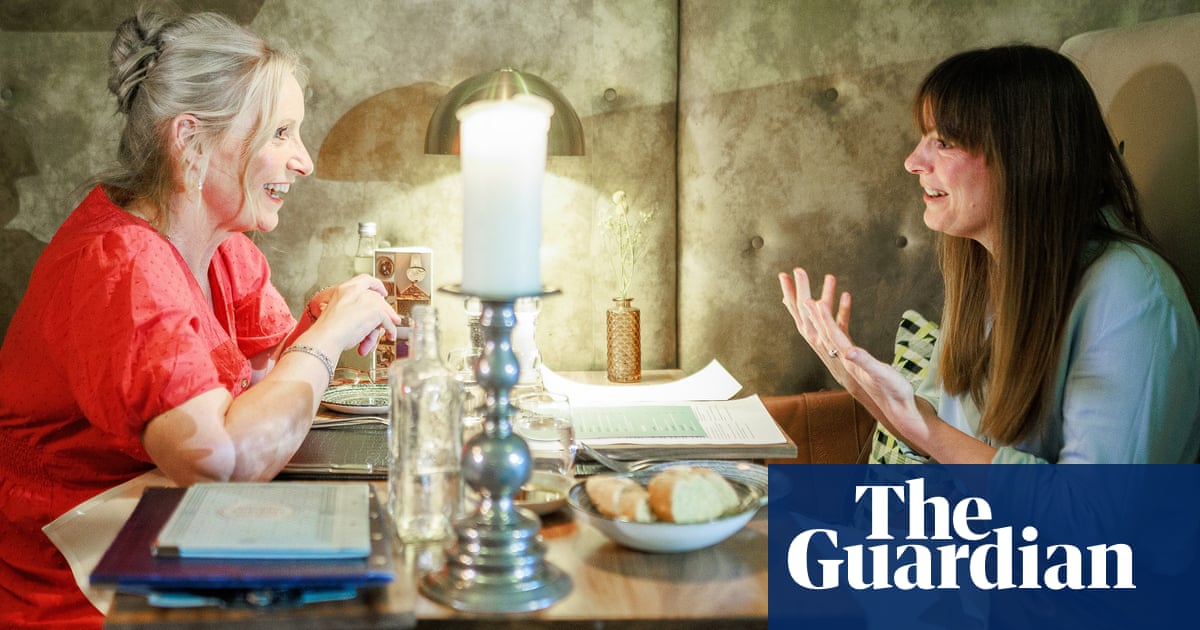OccupationEarly retired primary headteacher
Voting recordA diehard Lib Dem, but will vote tactically and loves Labour’s Cat Smith, who she says is a great local MP
Amuse boucheShe’s a governor of two independent schools in Kazakhstan, one in its capital, Astana, and one in Almaty
OccupationGeography lecturer
Voting recordUsed to vote Labour, but was put off by their stance on the Palestinian cause and their attitude to the left. Now votes Green
Amuse boucheOnce, she and some flatmates made their own version of Findus Crispy Pancakes from scratch
EmmaShe seemed very nice, very smiley. We were having a bit of banter outside straightaway.
SueThe first two minutes were awkward, but once we had looked at the menu we didn’t shut up.
EmmaWe both had surf and turf. She ordered it and I had to ask the waitress how to use the tools to eat the lobster. It was delicious.
SueI had chocolate mousse for dessert, and Emma had raspberry and elderflower sorbet. It was beautiful; the whole place was gorgeous.
EmmaThe main bone of contention was that she said “woke” had gone too far. It was originally an African-American term that means being aware of structural racism. So to suggest it’s gone too far is to suggest anti-racism has gone too far, that social justice has, which it obviously hasn’t. It must be very frustrating for African Americans, that their language gets co-opted. It’s important to remember who it belongs to and not let it be neutralised.
SueIf by “woke” you’re talking about protected characteristics, then obviously I respect those; they are absolutely essential. But I feel it stifles free speech, and those who are marginalised become even more so.
EmmaSue has worked in schools in a lot of really deprived communities. Her concern is that when you get this intellectual censoriousness of liberal identity politics, the people the left should be serving are excluded.
SueIf you over-police and don’t look at context, you won’t have any idea where people are coming from; whether they might be receptive to changing their view. You have to really work to understand what it’s like when you haven’t got a voice. Somebody who hasn’t had a privileged, middle-class education, who lives a hand-to-mouth existence – their reality is going to be polar opposite.
SueI bet Emma is an amazing lecturer. She speaks with such passion about the young people she’s working with. And I was talking with equal passion about the children I’ve worked with – lack of school readiness is really striking. We had children whose socialisation, speech, potty training, just general physical strength, weren’t where they should have been. They hadn’t got the pincer grip needed to write because they’d used screens and simply swiped.
EmmaWe’re both quite anti social media; neither of us use it. We both think young people need to spend more time outside, and we’ve seen negative impacts in the cohorts we teach. Nowadays, students come to university and it will be their first time pushed into independence, very high stakes. I think it affects their happiness. They seem very stressed, and you shouldn’t be stressed when you’re 19 – you should be living your best life.
EmmaI work in the environment department at the university and I live in an eco-community, so all my friends and colleagues were saying: “You’ve got to say this about net zero, you’ve got to say that.” And then I met Sue and she said: “I’ve got an environmental science degree, I’m not against net zero.”
SueShe thought I was going to be all “Drill, baby, drill”. She said: “Shall I tell you about my eco house?” And I said: “Yes, please.”
EmmaI almost felt like I doing aBlind Date. We had loads of very personal conversations, and kept saying: “This doesn’t go in the paper.” We ended up going very deep.
SueWe had so much in common. She’s the type of person I would want to be friends with. She’s absolutely authentic and I trusted her.
Additional reporting: Kitty Drake
Emma and Sue ate atQuite Simply Frenchin Lancaster.
Want to meet someone from across the divide?Find out how to take part
